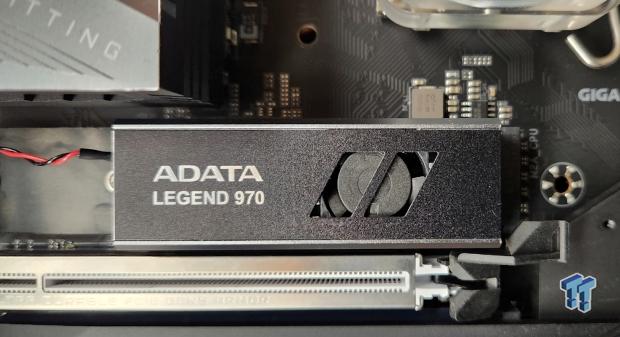
The Bottom Line
Pros
- + Throughput
- + Gaming
- + User experience
- + Runs cool at 10,000 MB/s
Cons
- - Fan noise (maybe)
Should you buy it?
AvoidConsiderShortlistBuyIntroduction & Drive Details
So far this year, we've reviewed a bunch of 10,000 MB/s class PCIe Gen5 SSDs, including the FireCuda 540, Corsair's MP700, SSTC's Tiger Shark, inland's TD510 2TB, and GIGABYTE's AORUS Gen5 10000. Now, ADATA has thrown its hat into the ring as well and is doing so with its own unique twist on things. That twist is aimed at taming problematic thermals that go hand-in-hand with 10,000 MB/s throughput.
ADATA's newly minted 970 Legend, like all PCIe Gen5 10,000 MB/s class SSDs to date, is Phison E26 controlled and arrayed with Micron 232-Layer B58R 1,600MT flash. This is a proven potent combination that is currently the second best performing of all time, only slightly surpassed by the lone and somewhat more expensive, 12,000 MB/s class E26/B58R 2,000 MT flash arrayed Crucial T700.
In effect, all of these 10,000 MB/s class SSDs are the same base piece of hardware, with the differentiator between brands coming down to labeling and or cooling mechanism. To date, about half of the options out there have active or passive heatsinks. The other half have chosen to leave it to the end-user to provide the required thermal mitigation.
The 970 Legend comes standard with an actively cooled heatsink, which is something we've seen before from inland's TD510. However, unlike what comes with the inland drive which is the same standard cooler that our E26 engineering sample came with, ADATA has chosen to develop its own actively cooled heatsink for the 970 Legend.
ADATA's patented heatsink design is coated with a unique crystalline surface for improved thermal conductivity. ADATA claims its design, compared with a fanless heatsink, can reduce temperatures by up to an additional 10%. We verified this to be the case by subjecting our test subject to a brutal, in terms of heat generation, ATTO run, with the highest temperature we could attain being a cool 54c, as verified by CDI:
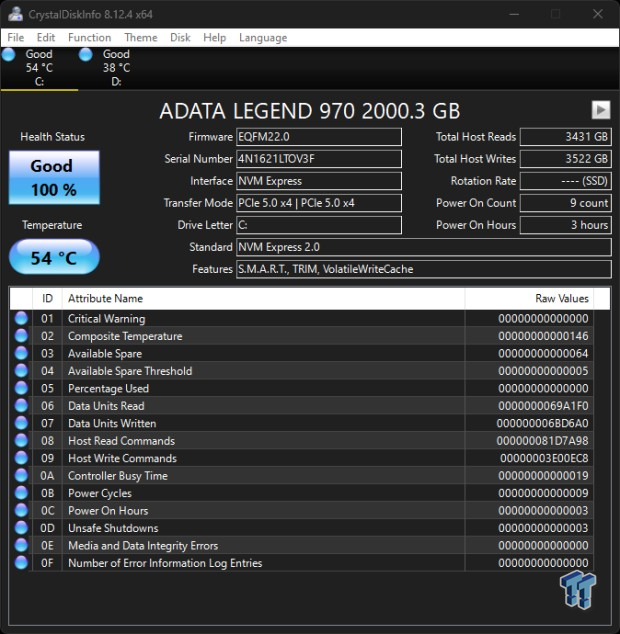
54c is indeed about 10% lower than we saw from the passively cooled AORUS Gen5 10000 SSD. 54c at full tilt on a 10,000 MB/s class SSD? Hey, we'll take that.
So ADATA's claim to fame, as it relates to the current crop of 10,000 MB/s class SSDs, is that its version runs cooler than the rest. However, we would be derelict in our duties if we did not point out a couple of inherent idiosyncrasies that come with active cooling. The first being the cooler is SATA powered, so there is a power cord coming out of the back of the drive. The second is the noise coming from the fan. For us, it wasn't much of an issue even on an open test bench, but your personal preference mileage may vary.
Okay, now that we have a handle on what the Legend 970 is and what makes it somewhat unique compared with its direct competition, let's see what ADATA's flagship gaming SSD can do for you by the numbers.
Drive Details
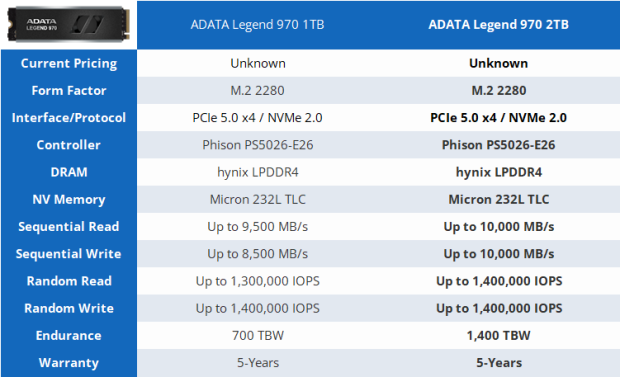
Unfortunately, as we are writing this report, we don't have any pricing for the Legend 970, but we are certain it will be priced aggressively, as are all SSDs these days. The Legend 970, like all ADATA SSDs, is fully compatible with the ADATA SSD ToolBox, which even does cloning for you, making it the most feature-rich toolbox in the industry. Best of all, it's absolutely free.
In addition to what is spec'd above and worthy of mention here, is the fact that all E26 controlled SSDs come with Phison's exclusive I/O+ DirectStorage optimized technology baked right in. The perfect partner for NVIDIA's RTX IO technology. Gamers take note because this matters if you are into future-proofing.
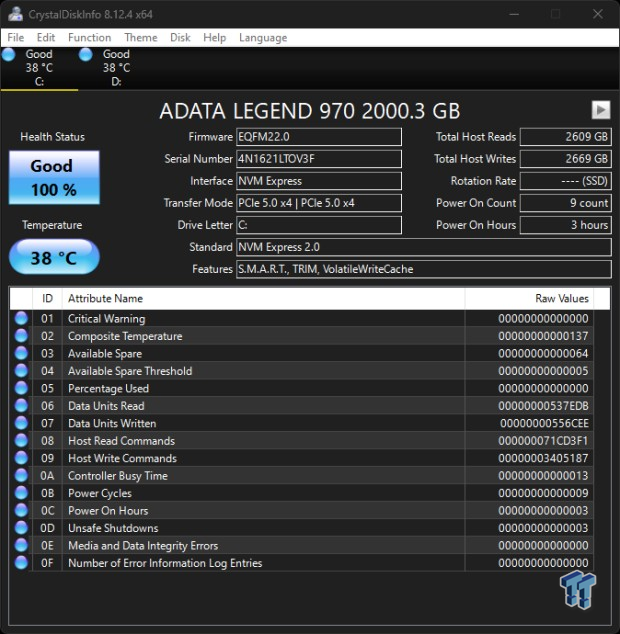
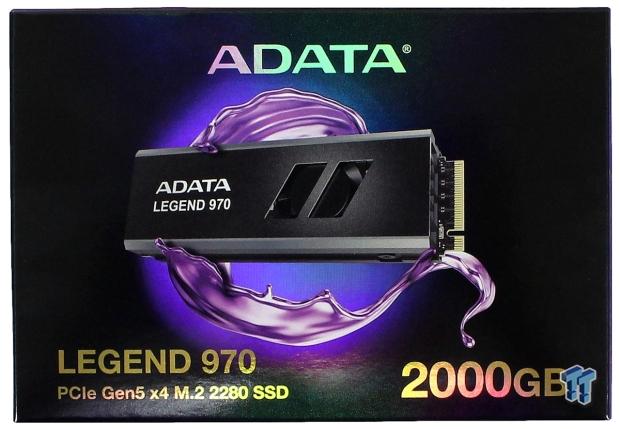
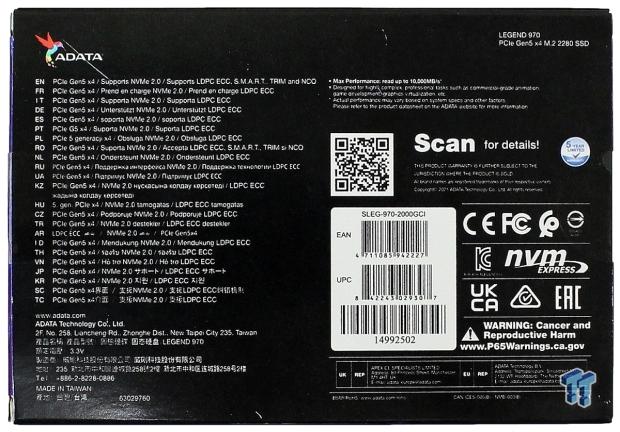


Jon's Test System Specifications
Intel Test System
- Motherboard: GIGABYTE Z790 AORUS Tachyon
- CPU: Intel Core i9-13900KS - Buy from Amazon
- Cooler: Alphacool Eissturm Hurricane Copper 45 - Buy from Amazon
- RAM: Sabrent Rocket DDR5 32GB - Buy from Amazon
- Graphics Card: MSI SUPRIM X RTX 3080 12GB - Buy from Amazon
- Case: PrimoChill's Praxis Wetbench - Buy from Amazon
- Power Supply: be quiet! Dark Power Pro 12 1200W - Buy from Amazon
- OS: Microsoft Windows 11 Pro 64-bit - Buy from Amazon
AMD Test System
- Motherboard: GIGABYTE B650E AORUS Tachyon
- CPU: AMD Ryzen 9 7950X - Buy from Amazon
- Cooler: Alphacool Eissturm Hurricane Copper 45 - Buy from Amazon
- RAM: Sabrent Rocket DDR5 32GB - Buy from Amazon
- Graphics Card: MSI SUPRIM X RTX 3080 12GB - Buy from Amazon
- Case: PrimoChill's Praxis Wetbench - Buy from Amazon
- Power Supply: be quiet! Dark Power Pro 12 1200W - Buy from Amazon
- OS: Microsoft Windows 11 Pro 64-bit - Buy from Amazon
Because we at TweakTown like to be first at everything whenever we can, we will present our storage performance results for the test subject on both 13th Gen Intel and 7000 Series AMD platforms going forward for the foreseeable future. Because Intel still delivers the best real-world storage performance, (Look Here), our running chart will continue to be Intel-based until AMD can deliver better real-world storage performance than its rival.

Synthetic Benchmarks: CDM, Anvil, ATTO
CrystalDiskMark
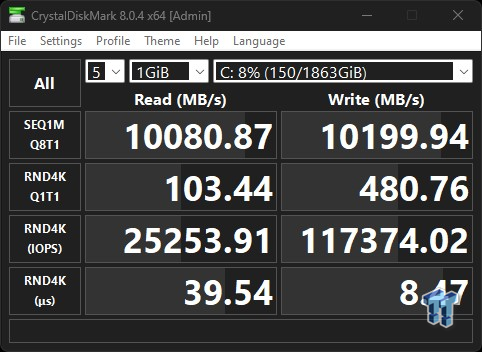
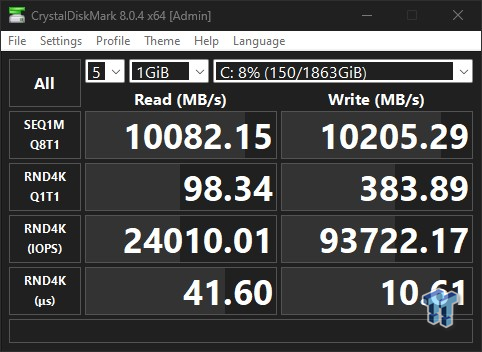
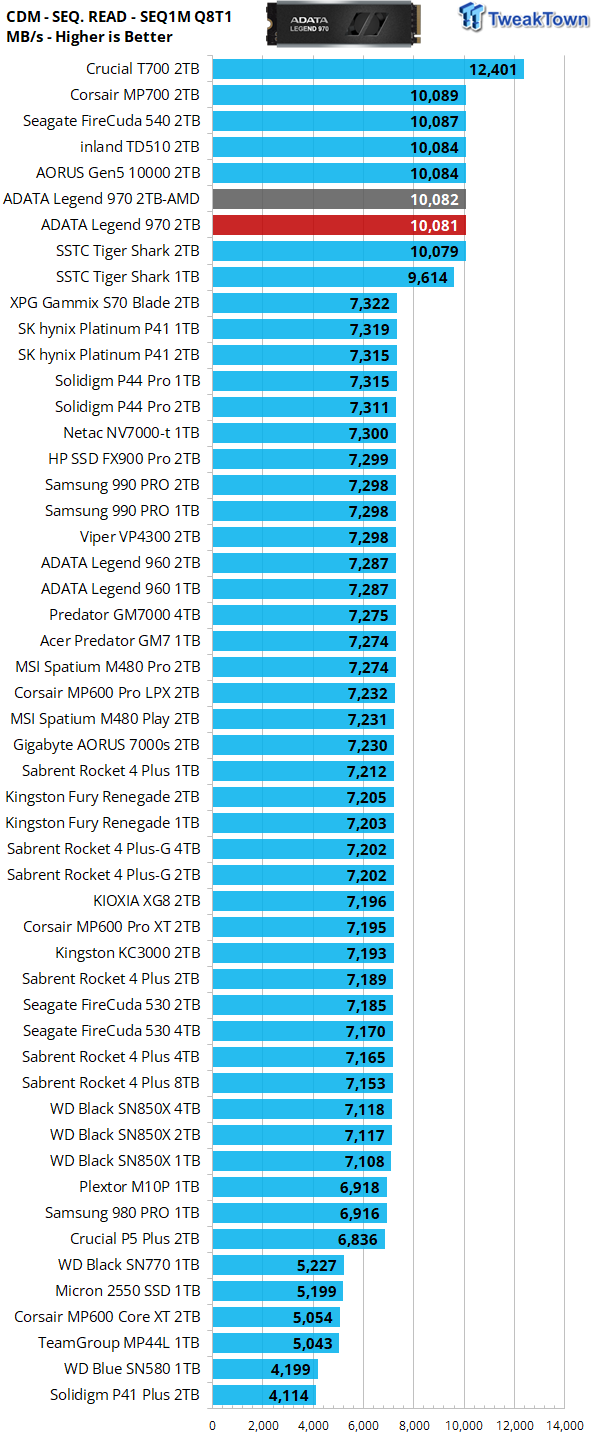
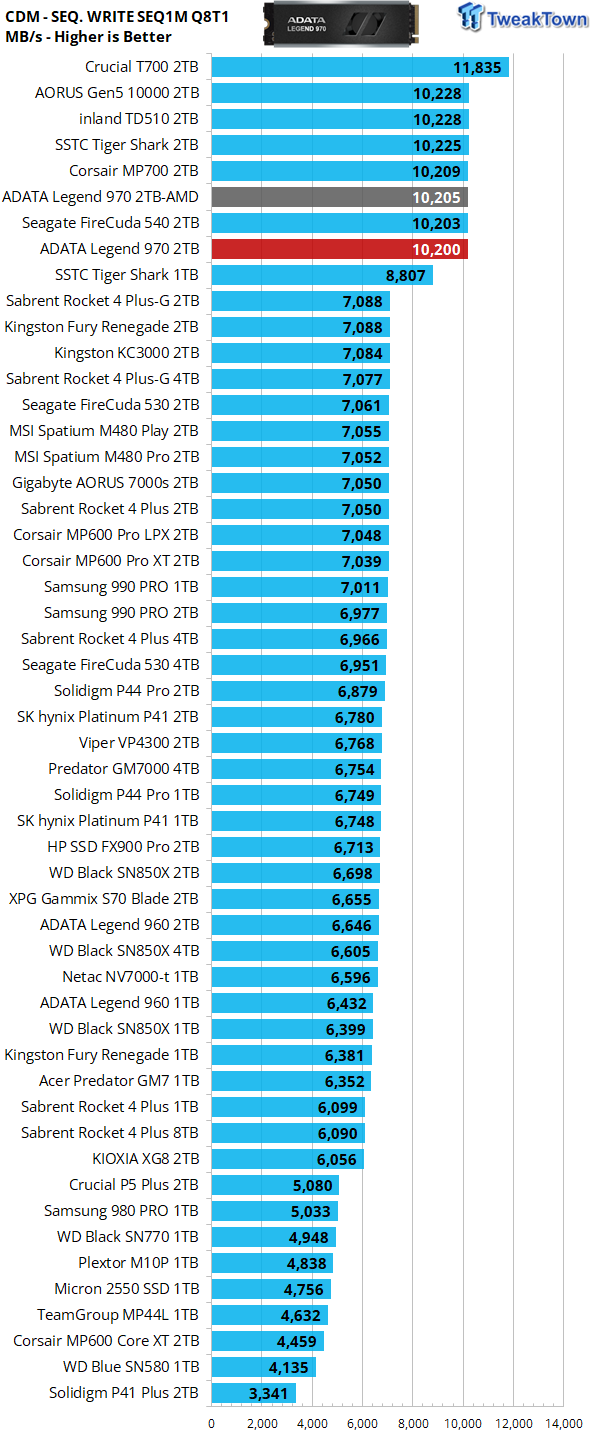
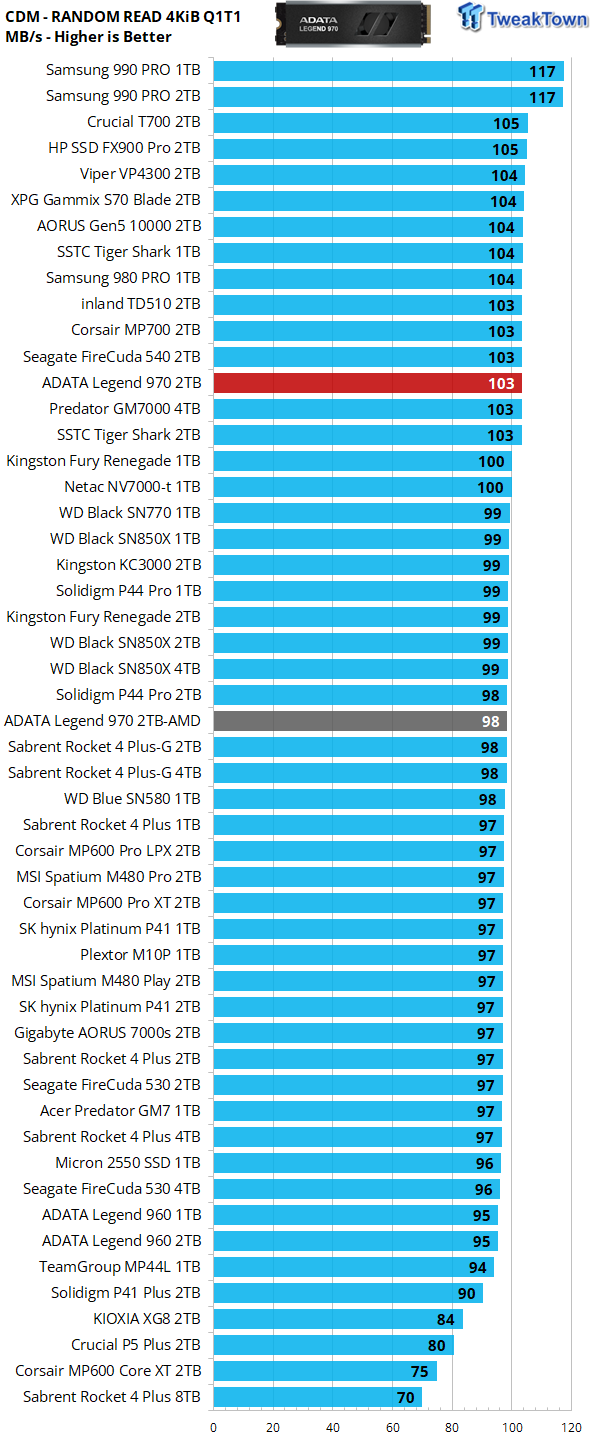
We employ CDM as our standard measurement for sequential throughput and Q1T1 random read. The Legend 970 2TB delivers that 10,000 MB/s sequential read/write throughput we've come to expect from this hardware configuration and does so even running in our more demanding user state of system disk with 150GB data. 4K random read is exactly where we want to see it as well.
Anvil's Storage Utilities
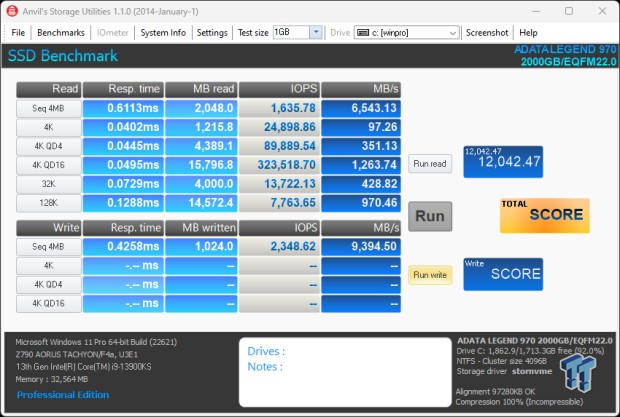
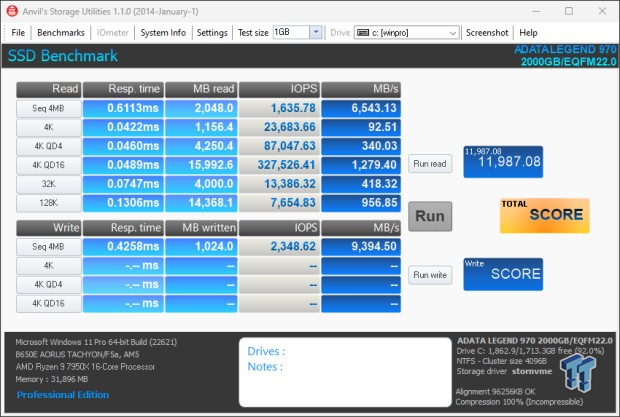
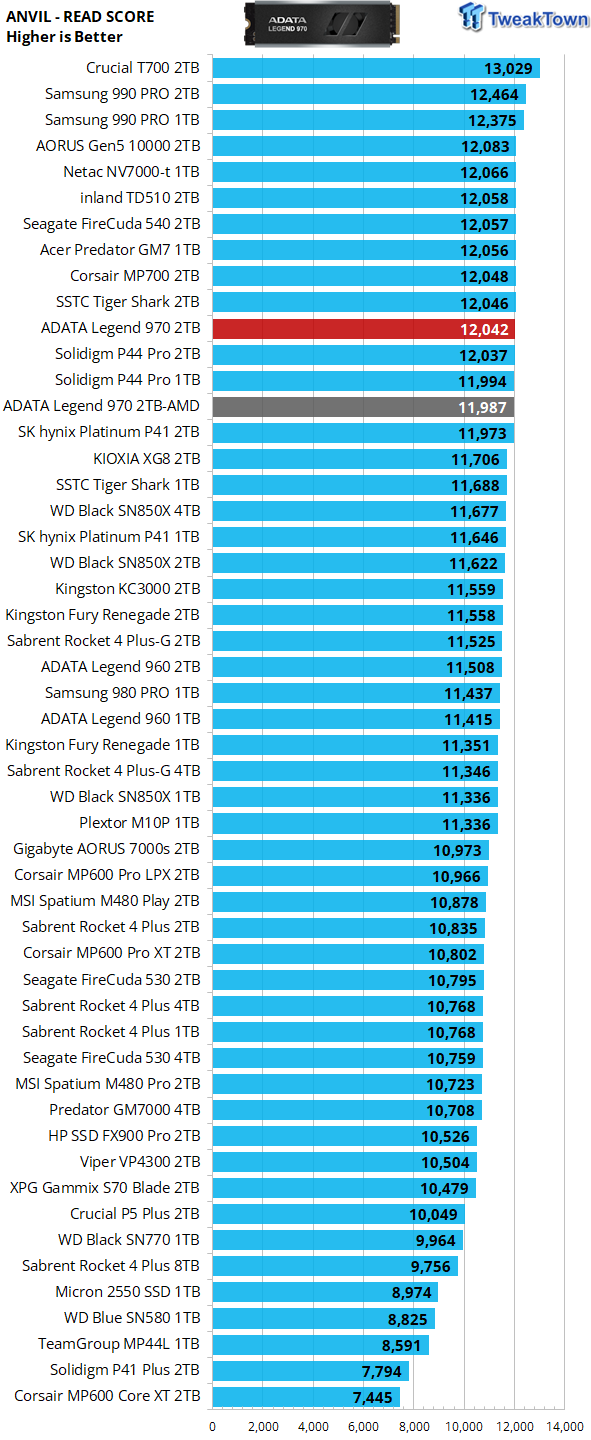
We are looking for a read score of 12K here with this hardware configuration, and our test subject delivers the goods on both Intel and AMD platforms. Excellent.
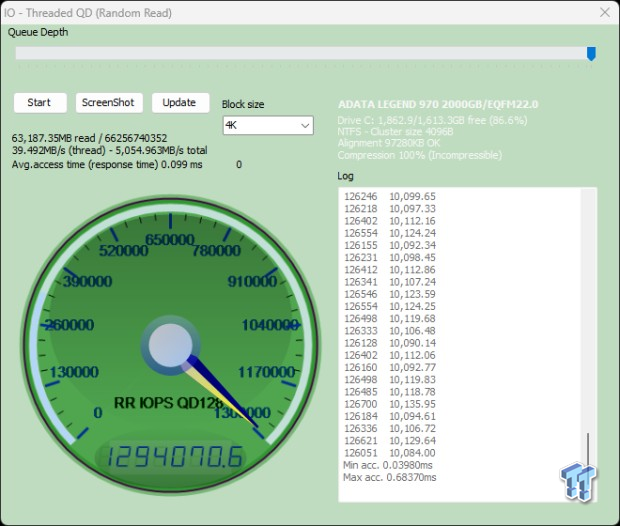
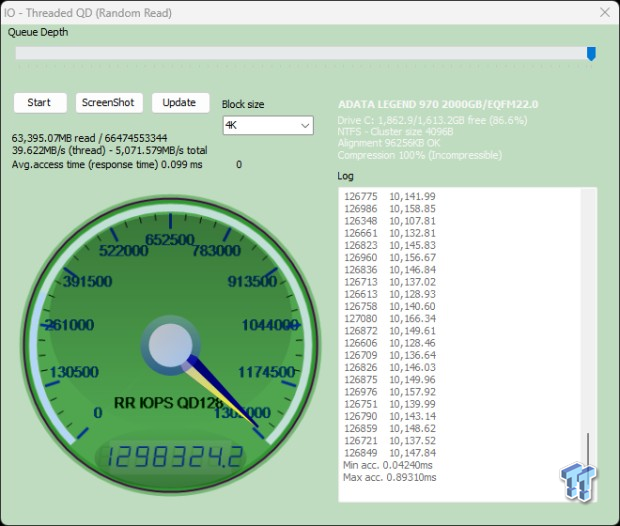
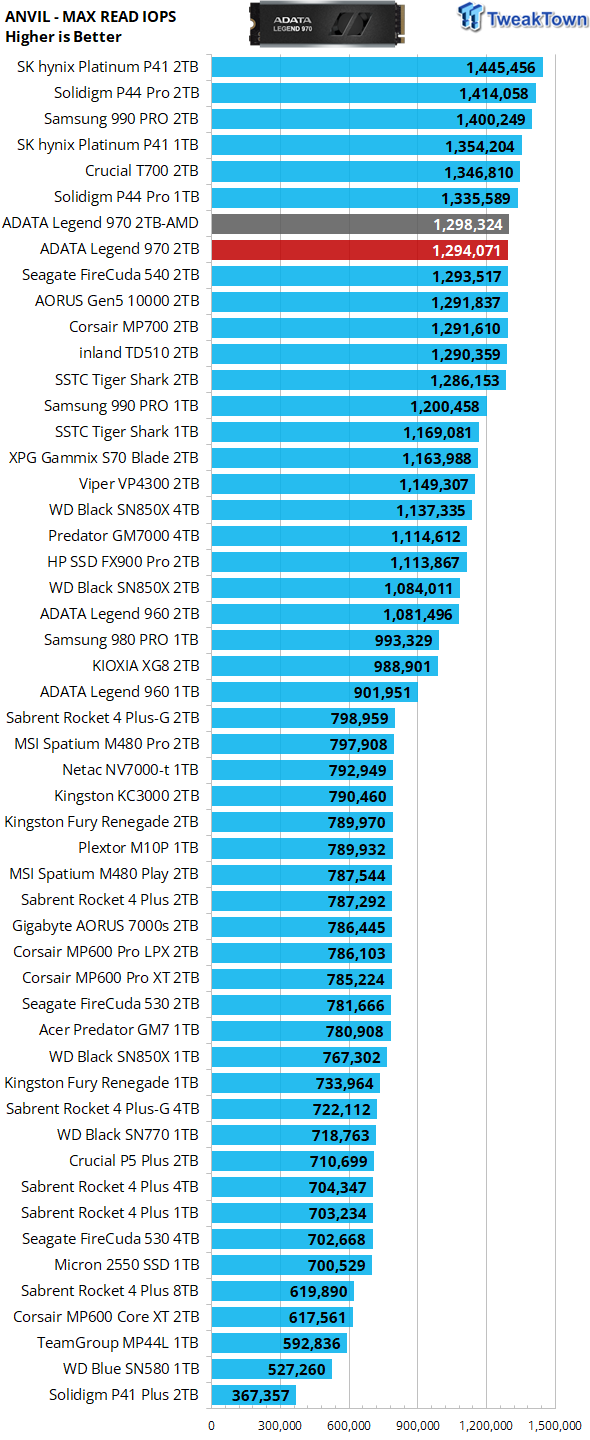
We employ Anvil's random read test as our standard for measuring max random read IOPS. This test is very accurate as it at its core is Iometer skinned over. We test at QD128. 1.29 million IOPS here, even if it falls a little short of factory up to specs, is more than satisfactory considering our more demanding user state of the system disk with 150GB of data onboard. Additionally, we note the Legend 970 is delivering the most random throughput we've extracted to date for any 10,000 MB/s class SSD. Outstanding.
ATTO
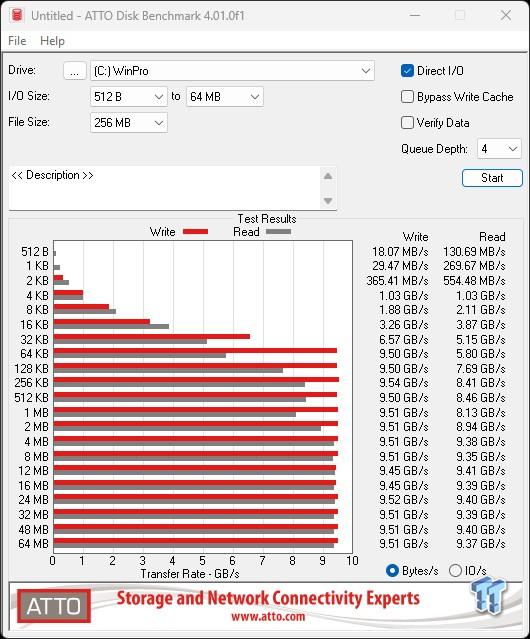
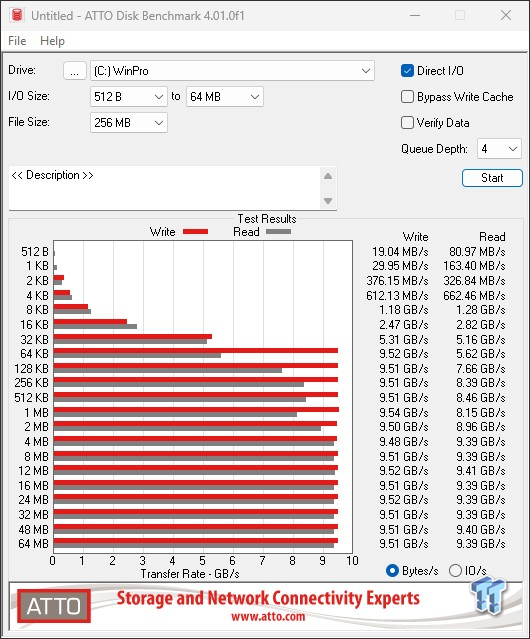
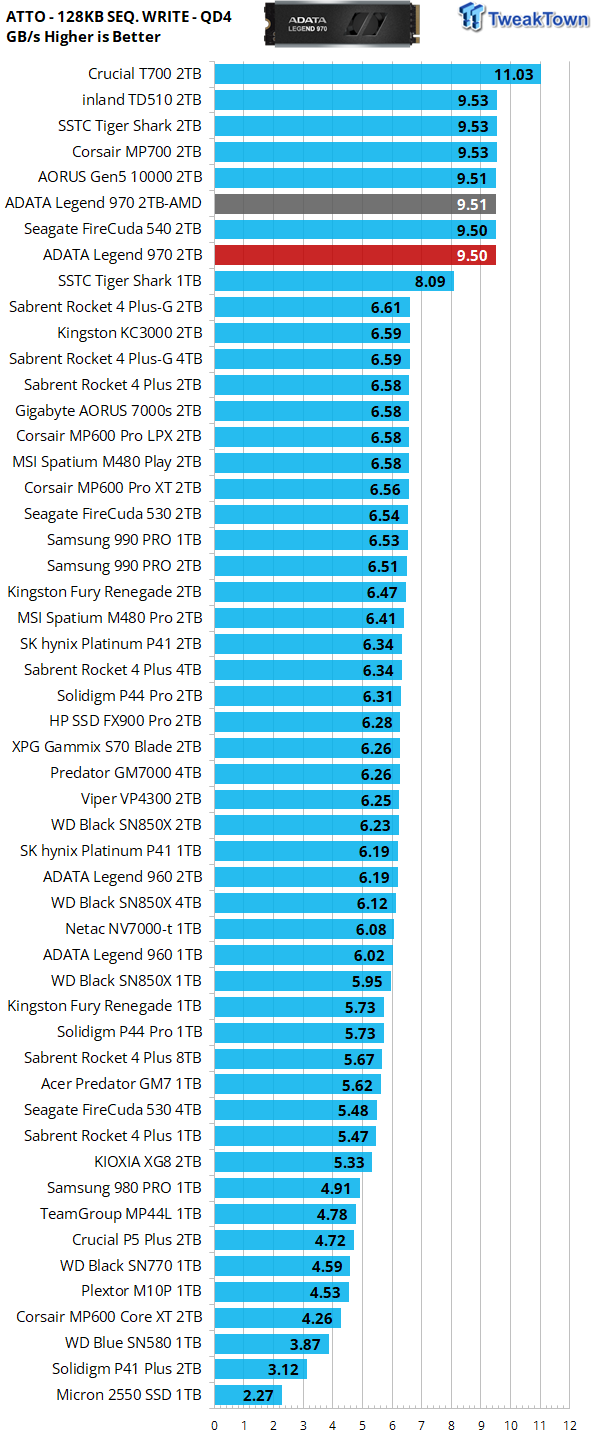
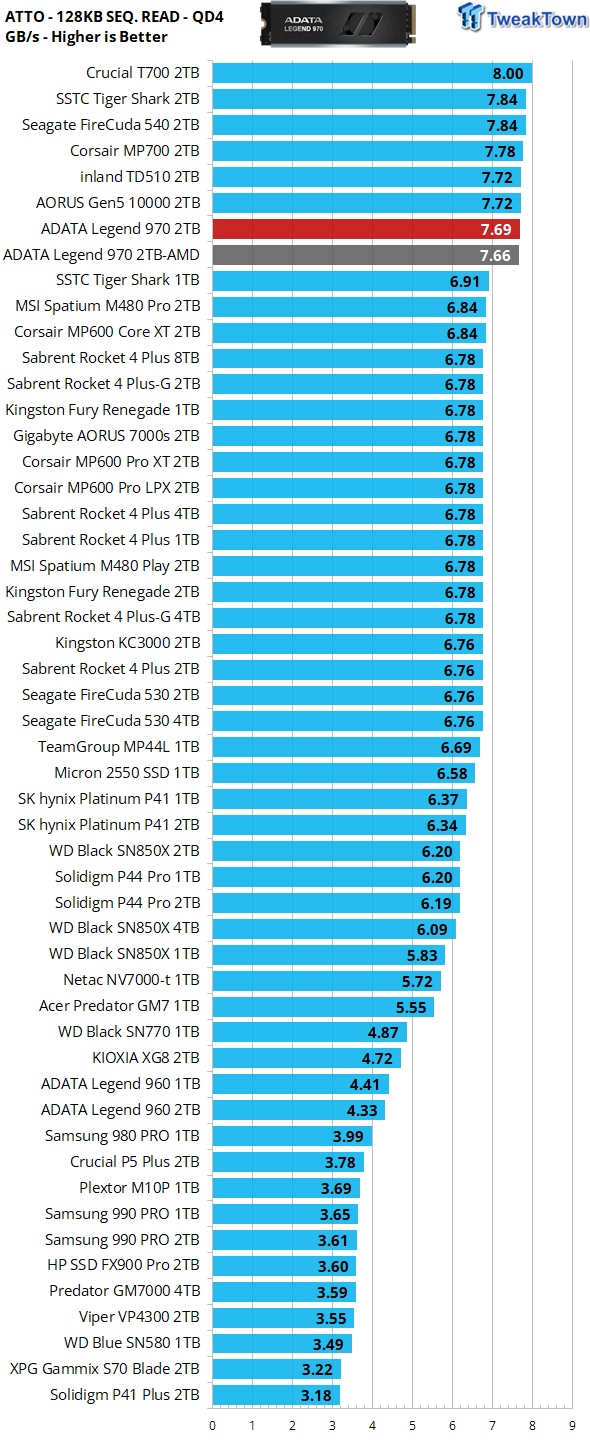
ATTO gives us a clear picture of what transfer sizes a particular SSD favors in terms of sequential throughput. We chart 128K transfers. Our test subject favors sequential transfers of 4MB or larger when serving data to the host (reading) and 64K or larger when programming (writing) data.
Real-World Testing: Transfers, 3DMark SSD Gaming Test, PCM10 Storage
Transfer Rates
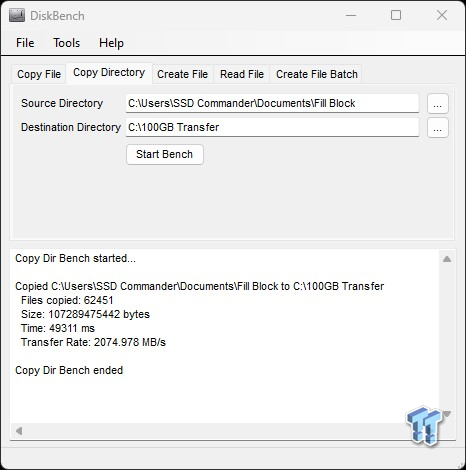
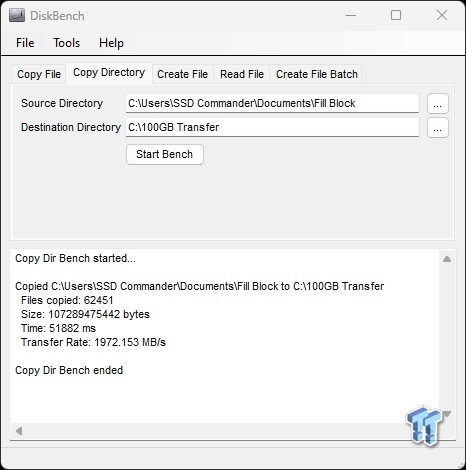
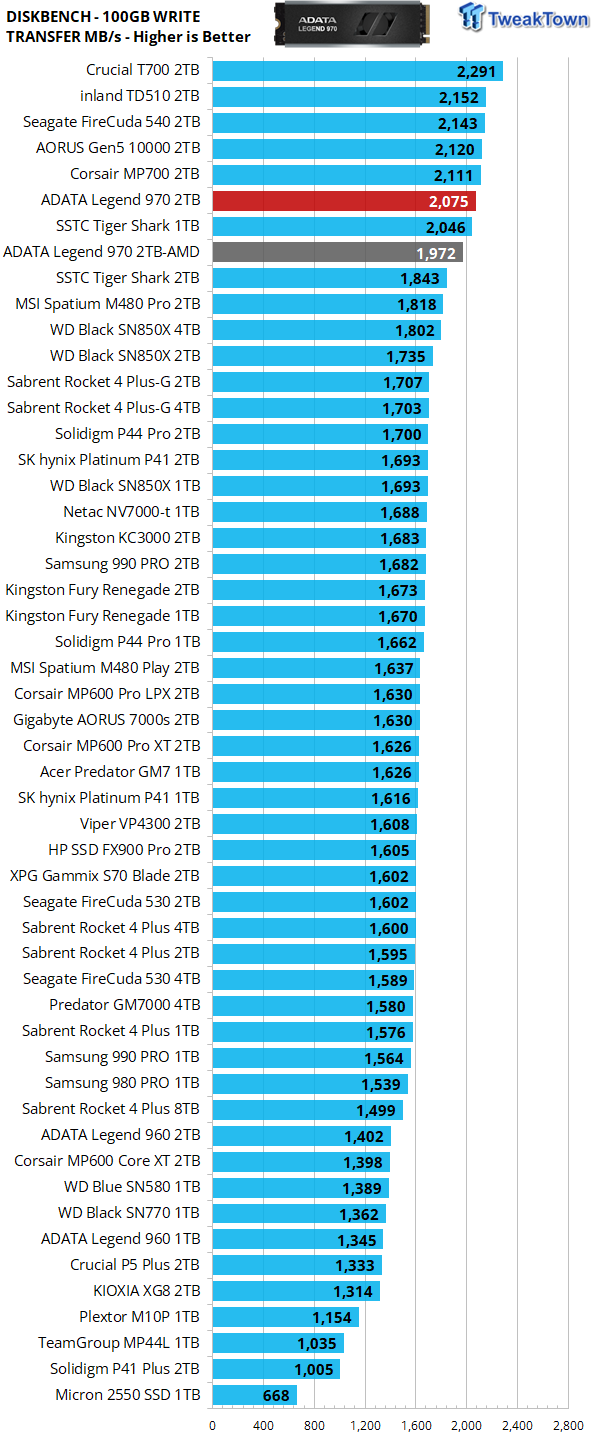
Our 100GB data transfer test is not your ordinary 100GB of data. Ours is a crushing mix composed of more than 62K files. Write performance random or sequential, is an infrequent operation, and as such, we do not consider it to be an important performance metric in the consumer space. An example being how many times is a game installed vs. how many times it's played. Intel has the advantage when writing large blocks of data.
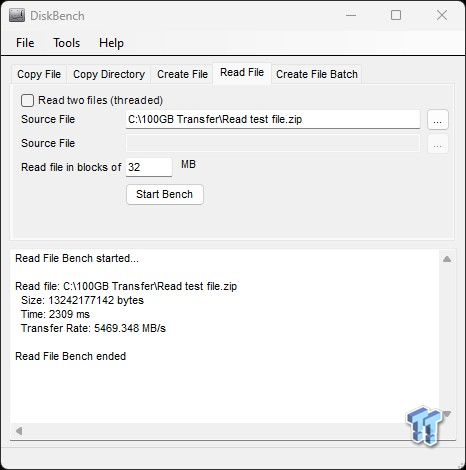
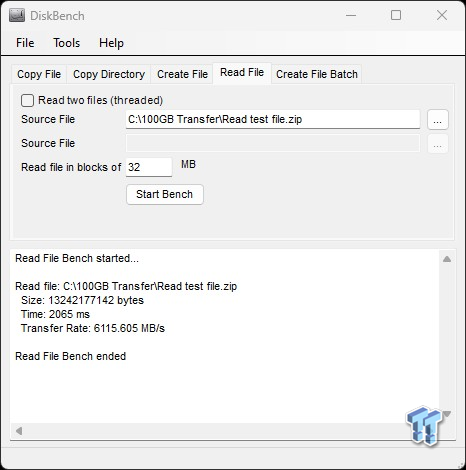
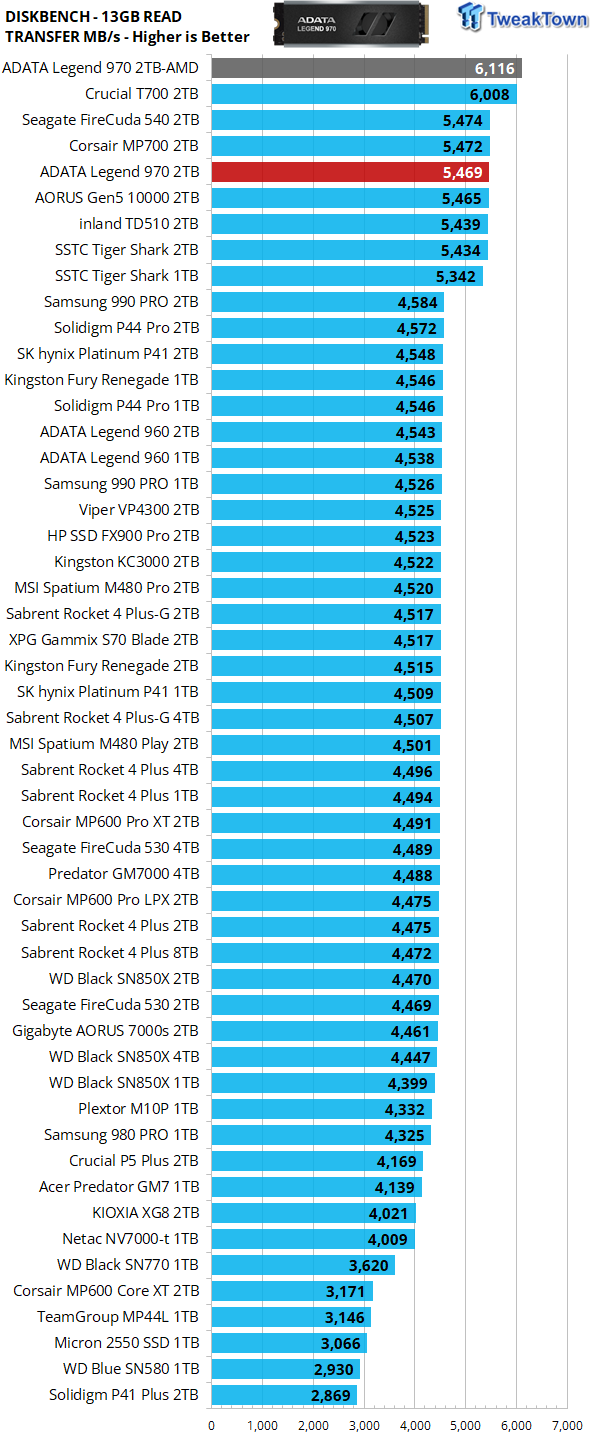
Unlike programming (writing) data, serving data to the host (reading) data is always an important performance metric as it relates to the consumer space. AMD has the advantage here because the transfer is relatively sequential in nature.
3DMark SSD Gaming Test
UL's newest 3DMark SSD Gaming Test is the most comprehensive SSD gaming test ever devised. We consider it superior to testing against games themselves because, as a trace, it is much more consistent than variations that will occur between runs on the actual game itself. This test is the same as running the actual game, just without the inconsistencies inherent to application testing. In short, we believe that this is the world's best way to test an SSDs gaming prowess and accurately compare it against competing SSDs. The 3DMark SSD Gaming Test measures and scores the following:
- Loading Battlefield V from launch to the main menu.
- Loading Call of Duty Black Ops 4 from launch to the main menu.
- Loading Overwatch from launch to the main menu.
- Recording a 1080p gameplay video at 60 FPS with OBS (Open Broadcaster Software) while playing Overwatch.
- Installing The Outer Worlds from the Epic Games Launcher.
- Saving game progress in The Outer Worlds.
- Copying the Steam folder for Counter-Strike Global Offensive from an external SSD to the system drive.
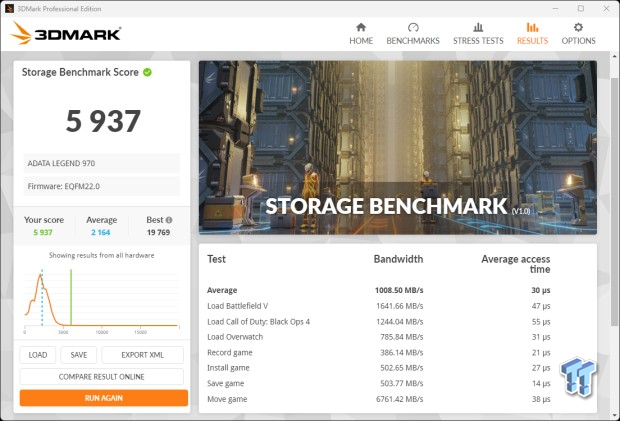
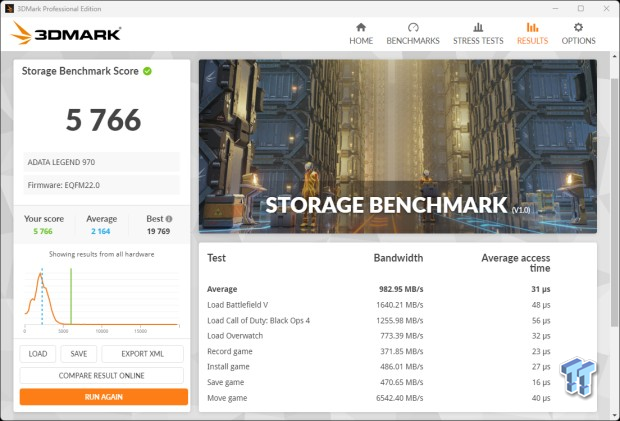
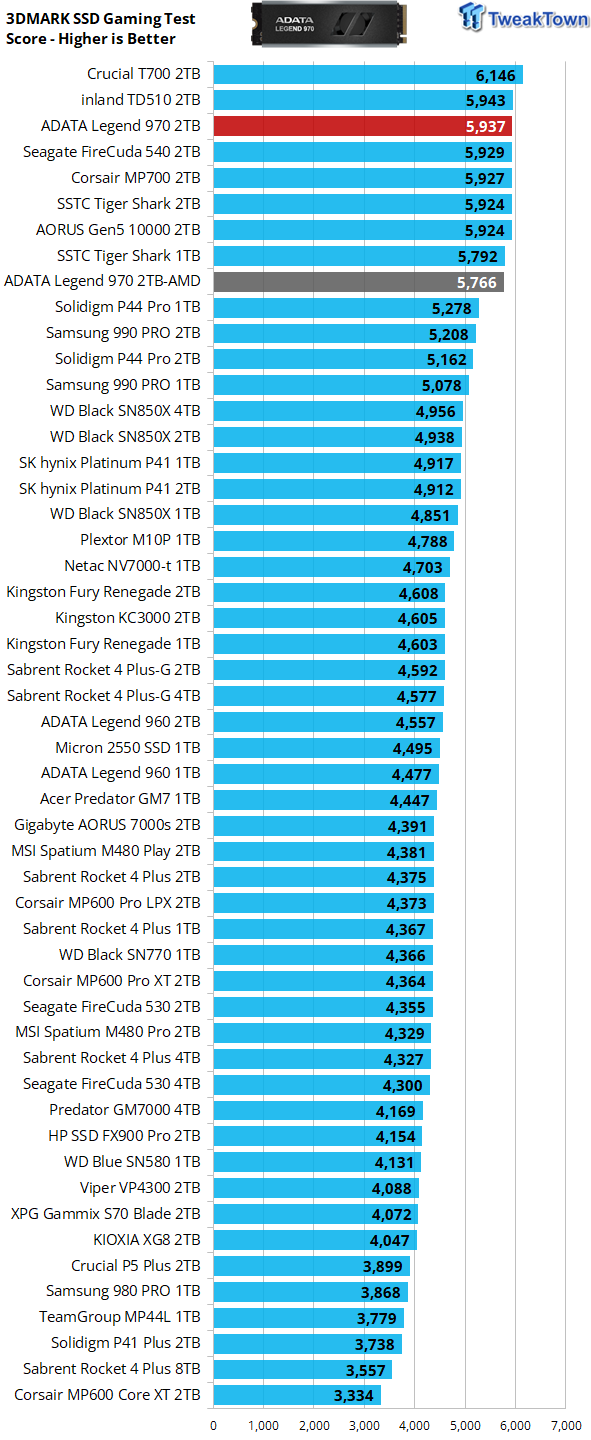
Gaming is a performance metric that matters to the majority of DIY consumers, especially to the enthusiast crowd that TweakTown caters to. This is performance that matters, and ADATA's newest delivers the third-best we've ever obtained from a flash-based retail consumer SSD. If you are a gamer looking for an edge, this DirectStorage-optimized SSD can give you that edge.
PCM10 Storage Tests
PCMark 10 Storage Test is the most advanced and most accurate real-world consumer storage test ever made. There are four different tests you can choose from; we run two of them. The Full System Drive Benchmark and the Quick System Drive Benchmark. The Full System Drive Benchmark writes 204 GB of data over the duration of the test. The Quick System Drive Benchmark writes 23 GB of data over the duration of the test. These tests directly correlate with mainstream user experience.
PCMark 10 Full System Drive Benchmark
This particular test writes 204GB data and covers a broad range of common consumer tasks, including booting Windows 10, file transfers, Adobe and Office applications, and startup times for games, including Battlefield V, COD Black Ops 4, and Overwatch. Unlike synthetic numbers, this is comprehensive real-world data which is why we use it to rank SSDs in terms of user experience.
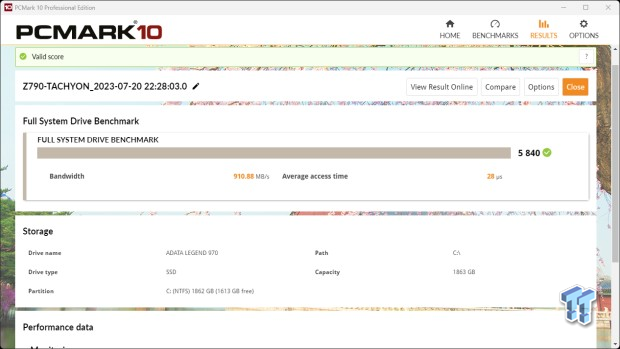
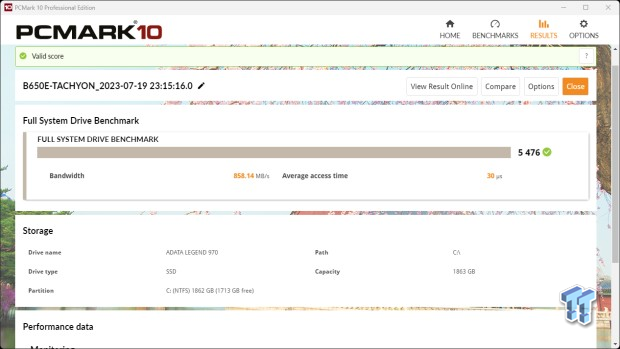
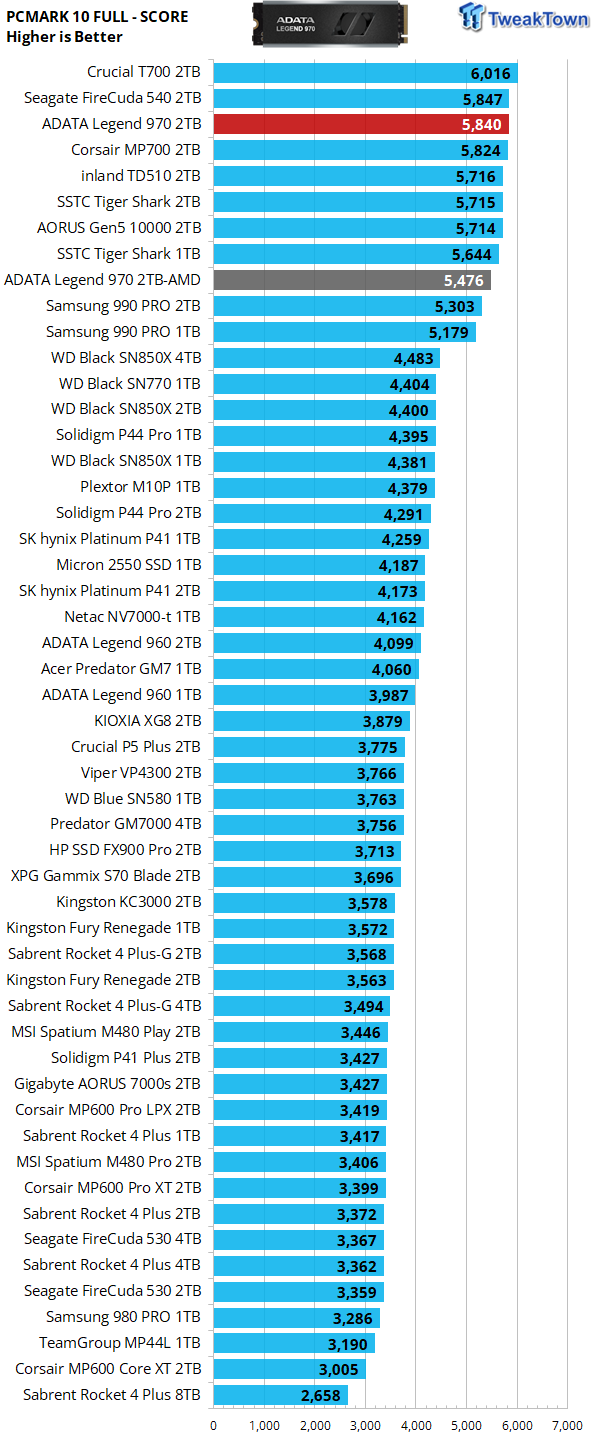
The Legend 970 2TB cranks the second best-ever for 10,000 MB/s SSD running in our user state. That's impressive because this is performance where performance matters most, and the drive is running nice and cool the entire time.
PCMark 10 Quick System Drive Benchmark
The Quick System Drive Benchmark writes 23 GB of data over the duration of the test.
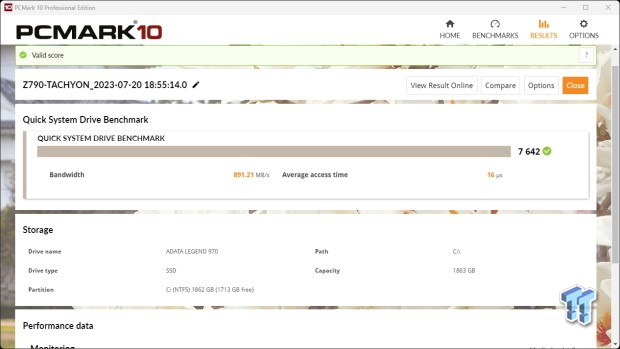
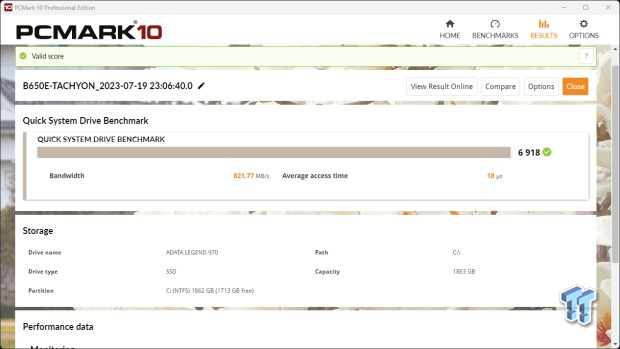
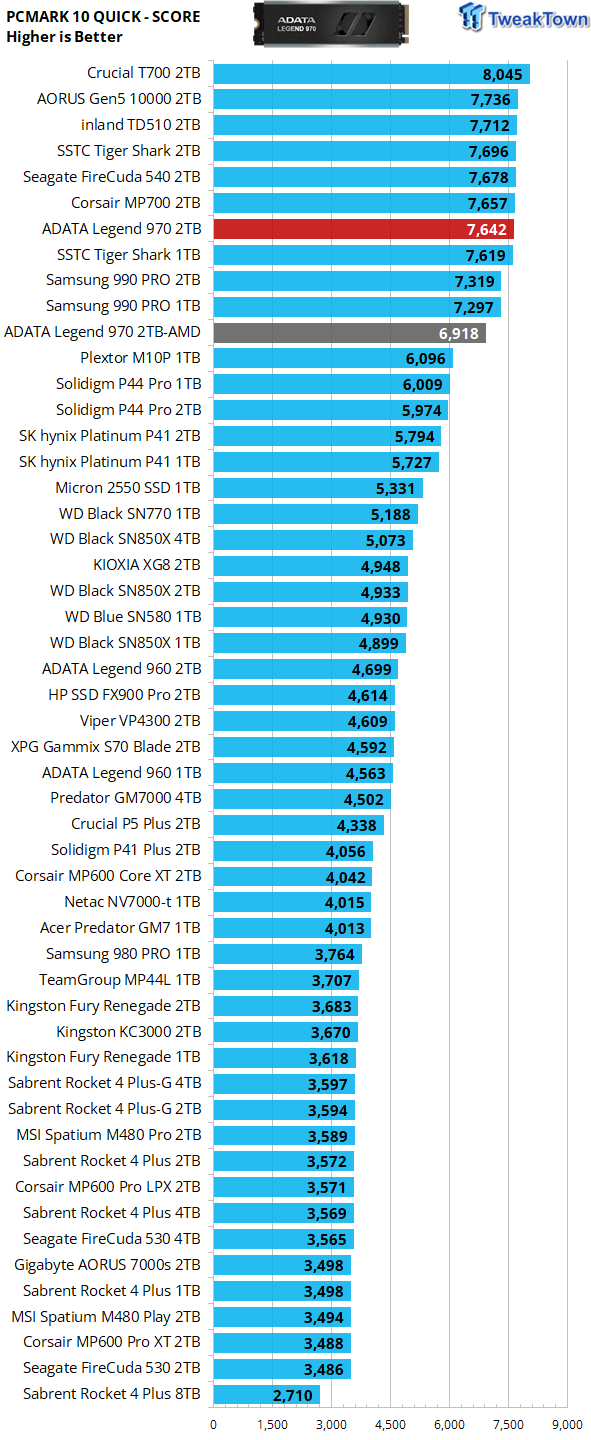
As fully expected, our 2TB test subject delivers at minimum 6% more muscle than the very best Gen4 can muster. At maximum, 285% better than the lowest spot on our chart. Another clear demonstration of PCIe Gen5 superiority as delivered by Phison Electronics and ADATA. Excellent.
Final Thoughts
Well, the latest in ADATA's Legendary "Legend" Series, pun intended, is, in our opinion, a winner based on its next-gen performance capabilities and the ability to run cool while dishing out that 10,000 MB/s throughput. We don't have exact pricing at this time, but if it is within striking range of its direct competition, it might be the better option based on its inherently worry-free, throttle-free design and compatibility with ADATA's supremely functional SSD ToolBox with built-in cloning. As we see it, it is the complete package.
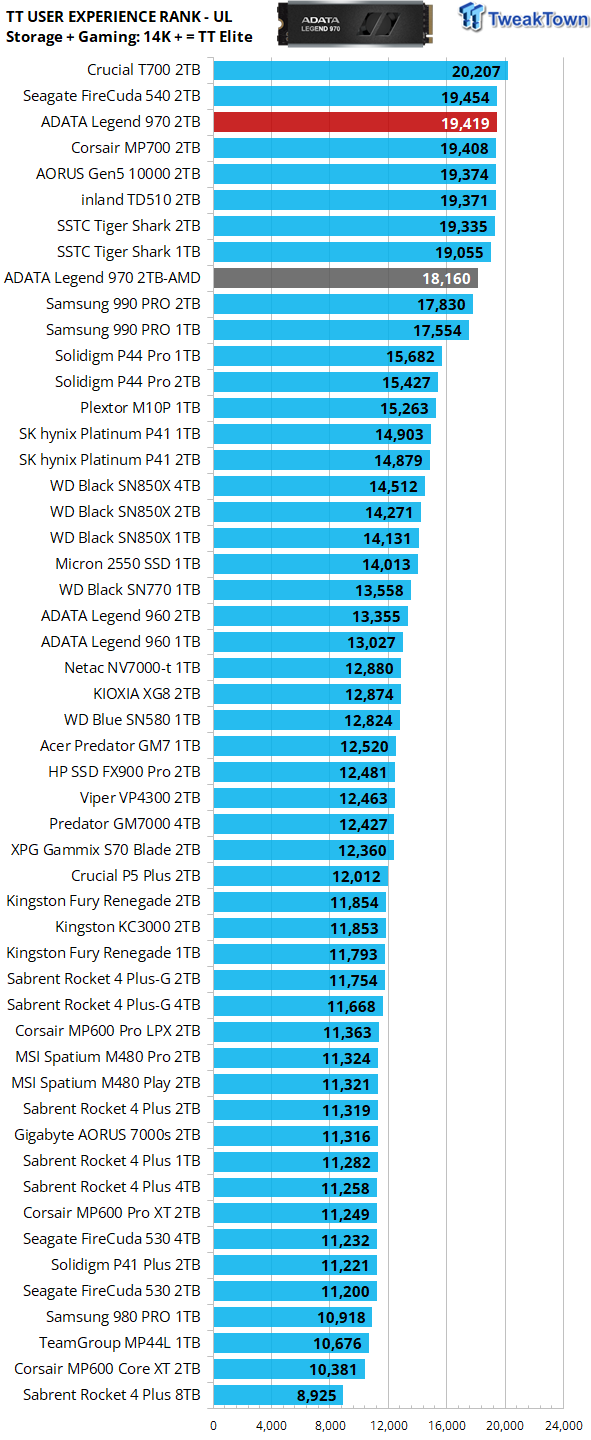
We rank SSDs in terms of overall user experience (performance where it matters most) as expressed by PCMark 10 storage and 3DMark gaming storage tests. We consider a user experience score of 14K or more to verify an SSD as a TweakTown Elite performer. With a user experience score of over 19.4K, the Legend 970 2TB is not only certified TweakTown Elite but is the overall third-best performing flash-based SSD we've tested to date. Impressive.
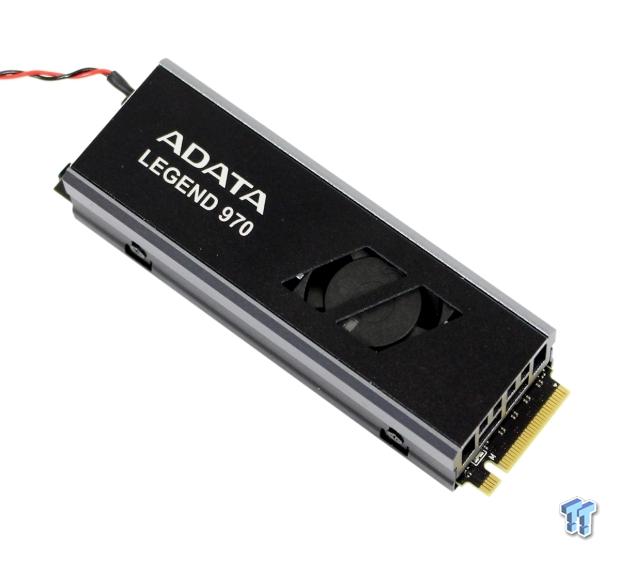
ADATA's Legend 970 is one of the most performant SSDs we've ever tested, making it worthy of our most prestigious award. Editor's choice.

